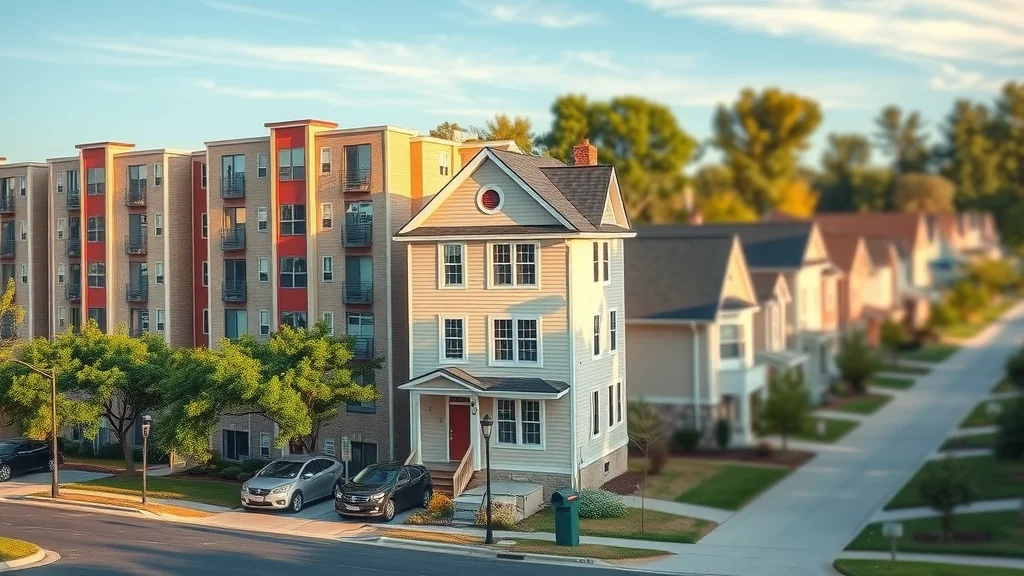Did you know Charlotte’s average rent jumped over 8% in the past year—outpacing both Raleigh and Atlanta? If you’re thinking about moving, searching for an apartment, or want to understand why charlotte nc rental prices seem sky-high lately, you’re not alone. With rapid development, a growing population, and plenty of buzz surrounding popular neighborhoods, it’s crucial to get the facts on what’s really happening in the Queen City’s rental market. This guide unpacks current rent price trends, neighborhood breakdowns, expert forecasts, and practical strategies to help you navigate Charlotte’s changing rental landscape.
Startling Trends: Charlotte NC Rental Prices Are Rising Rapidly
Over the last 12 months, Charlotte NC rental prices have surged faster than most major Southeastern cities. Rent data from leading sources shows the average rent in Charlotte now approaches $1,700 for a one-bedroom apartment—significantly above the national average for similar property types. The demand to rent in Charlotte continues as younger professionals, families, and remote workers flock to Uptown, South End, and other popular neighborhoods. As construction cranes line the skyline and new high-rise apartments appear, the city is feeling the squeeze: more residents means greater competition for units, which keeps pushing rent prices upward. If you’re searching for an apartment in Charlotte, prepare to pay more than just a year or two ago, and expect to face tighter application processes and fewer incentives from property managers.
The rise isn’t limited to luxury complexes either. Across townhomes, condos, and even many single-family homes, rent price increases are widespread. East Charlotte, West Charlotte, and other historically affordable neighborhoods have also seen rental rate hikes, closing the gap some between traditionally expensive neighborhoods in Charlotte (such as South Park and Myers Park) and areas once lower than the national average. The pace of change is gaining national attention, positioning the Queen City as one of the country’s most competitive rental markets, regardless of property type or number of bedrooms.

Unpacking the Numbers: Recent Surges in Rent in Charlotte
Recent rent data confirms that renters pay more in Charlotte than ever before. Since early 2023, the average rent for an apartment in Charlotte has increased by nearly 10%, making it one of the highest jumps nationwide. In sought-after neighborhoods like South End or Uptown, you can expect to pay over $1,600 for a 1-bedroom—and as much as $2,900 for a 3-bedroom unit in prime locations. These rent prices are partly driven by the ongoing flock of tech workers, university graduates, and families drawn by Charlotte’s growing employment sector and amenities like Freedom Park and the city’s lively arts and dining scenes.
Yet, the pressures aren’t solely from in-migration. Low national average vacancy rates mean landlords can often choose from multiple well-qualified applicants, so incentives that once made renting in Charlotte attractive have declined. Even renters willing to consider a less popular neighborhood or a unique property type, such as historical districts or smaller duplexes, are feeling the pinch. The market data is clear: unless construction outpaces demand or economic forces shift significantly, average rent in Charlotte shows little sign of returning to previous lows.
“Charlotte's rental market has shifted dramatically in the last year, outpacing the national average.” — Local Real Estate Analyst
What You'll Learn in This Guide to Charlotte NC Rental Prices
The latest data on Charlotte NC rental prices and average rent trends
Comparison of rent in Charlotte by neighborhood and property type
Tips for renters navigating the rising charlotte rent market
Expert perspectives on factors influencing rent price shifts
Charlotte NC Rental Prices: Average Rent by Neighborhood and Property Type

Average Rent in Charlotte: A Comparative Table
Neighborhood |
Studio |
1-BR |
2-BR |
3-BR |
|---|---|---|---|---|
Uptown |
$1,430 |
$1,600 |
$2,000 |
$2,900 |
South End |
$1,500 |
$1,620 |
$2,030 |
$2,850 |
NoDa |
$1,320 |
$1,520 |
$1,950 |
$2,650 |
Plaza Midwood |
$1,310 |
$1,490 |
$1,935 |
$2,600 |
University City |
$1,120 |
$1,300 |
$1,750 |
$2,400 |
This comparative table makes it clear that average rent in Charlotte can fluctuate by several hundreds of dollars depending on the neighborhood. Uptown, South End, and NoDa remain popular neighborhoods commanding higher rents—especially for larger spaces. Meanwhile, University City and Plaza Midwood are more affordable neighborhoods, but even here renters pay more than in previous years. The range is wide, so knowing the rent price in each area will help you refine your apartment search and budget accordingly.
Charlotte Neighborhood Guide: Popular and Affordable Neighborhoods in Charlotte
Popular Neighborhoods: Uptown, South End, NoDa
Affordable Neighborhoods: University City, East Charlotte, Steele Creek
For those seeking the energy and convenience of a popular neighborhood, Uptown and South End provide easy access to jobs, nightlife, and public transit, but expect to pay a premium in rent. NoDa (North Davidson) appeals to artists and young professionals with its creative vibe and walkability, yet rental prices are climbing here as well. On the other hand, University City, East Charlotte, and Steele Creek represent top choices for renters seeking affordability and more space per dollar. Places like East Charlotte and Steele Creek also attract families and students but offer average rents that are significantly lower than historic Uptown or South End neighborhoods in Charlotte. By weighing location, amenities, and average rent, renters can strike a balance between desired lifestyle and budget.
Rent Price Variations by Property Type in Charlotte NC
Apartments versus Single-Family Homes
Condos and Townhomes
Luxury and Affordable Housing Options
The type of property you choose strongly affects what renters pay each month. Apartments in Charlotte—especially modern complexes with amenities—typically come with higher rent prices compared to older buildings or garden-style apartments. Townhomes and condos can offer a competitive alternative in popular neighborhoods, though condos often have HOA fees that sometimes get passed on in rental costs. Single-family homes, particularly in desirable school zones or near Freedom Park and major highways, fetch even higher rents, catering to families or professionals seeking space and privacy. Meanwhile, Charlotte’s growing stock of luxury housing pulls the average rent price higher, while the affordable housing supply lags behind. Comparing various property types helps clarify your true options for renting in Charlotte.

What Drives the Change in Charlotte NC Rental Prices?
Supply & Demand: Impact on Charlotte Rent and Average Rent in Charlotte
Population growth and migration
Construction of new units
Competition among property types
Charlotte’s population growth is now among the fastest in the nation. Thousands move to the area each year, attracted by job opportunities, educational institutions, and quality of life. As demand booms, construction struggles to keep up—even though developers are adding new units in South End and Uptown. This mismatch between supply and demand explains why charlotte nc rental prices have not just increased but have done so rapidly. The market’s appetite extends to all property types: from studios and one-bedroom apartments to larger family homes and condos. Many developers focus on luxury buildings, further raising average rent and narrowing affordable options.
Competition among property types is also a factor, as more people opt for rentals over ownership due to rising home prices and stricter mortgages. As a result, renters pay premiums, especially in areas near business centers, transit lines, and top-rated schools. Competition even impacts affordable neighborhoods; formerly lower-priced areas such as West Charlotte and Hidden Valley are seeing notable jumps as more room-seekers fan out from the city center. Unless construction accelerates or incentives shift, expect the current rent in Charlotte to remain strong under continued demand pressures.
Neighborhoods in Charlotte: How Location Influences the Average Rent
Expensive Neighborhoods in Charlotte: South Park, Uptown, Myers Park
Affordable Neighborhoods in Charlotte: West Charlotte, Hidden Valley
Location continues to be the strongest indicator of the average rent in Charlotte. Expensive neighborhoods in Charlotte—like South Park, Uptown, and Myers Park—not only offer sought-after amenities and excellent walkability but also command the highest premiums. These popular neighborhoods cater to professionals who want to shorten their commute or soak in city living. Conversely, affordable neighborhoods in Charlotte—such as West Charlotte, Hidden Valley, and University City—allow renters to secure a lower average rent, with added benefits like larger floor plans and green spaces. As rent data shows, location truly determines value: families or individuals prioritizing budget over proximity can often save significantly by looking beyond the city’s most popular enclaves. Researching each charlotte neighborhood and referring to detailed rent price reports will empower renters to make the best move for both wallet and lifestyle.
Charlotte NC Rental Prices: Trends, Predictions, and Market Analysis

Recent Trends in Charlotte Rent: Is This a Bubble?
Many Charlotte residents wonder if the surging rent prices represent a temporary bubble or a new normal. Looking at market data, rents are up nearly 20% from pre-pandemic levels, with only minor slowdowns. This jump is driven by supply constraints, persistent demand, and strong regional job growth. Unlike housing bubbles fueled by speculation, Charlotte’s rental market reflects genuine demographic shifts and limited inventory—a scenario that experts predict will continue unless major economic changes occur. Prospective renters should be aware that while growth may become less steep, significant rent decreases are unlikely in the near term.
“Rising home prices and high demand keep upward pressure on charlotte nc rental prices.” — Senior Property Manager
This situation isn’t unique to Charlotte, but it’s certainly extreme among major cities in North Carolina. South End, NoDa, and historic districts attract those ready to pay a premium for community, convenience, and access to amenities. Families and long-term renters are driving demand for three-bedroom apartments and single-family homes, making it tough for prices to stabilize. Mixed-use developments, public investments, and ongoing migration trends will shape the market trajectory heading into 2025 and beyond.
Charlotte Average Rent Predictions for 2024 and Beyond
Expert forecasts and economic projections
Potential impact of new developments and economic shifts
Industry forecasters expect average rent in Charlotte to continue its upward trend, though the rate of increase may soften as more multi-family units come online. Some experts estimate a 4–6% hike in 2024, provided the local economy stays robust and demand holds strong. New construction in affordable neighborhoods like University City could provide brief relief, but gentrification may trigger fresh jumps in rent price as these areas become more desirable. If mortgage rates decline or job growth slows, the rental market might see adjustments, but most analysts agree that charlotte nc rental prices will remain above the national average for the foreseeable future. For renters, being proactive—researching the best Charlotte neighborhoods and acting quickly on available listings—will be key to securing the right place at a competitive price.

People Also Ask: Your Charlotte NC Rental Price Questions Answered
Is rent expensive in Charlotte, NC?
A: Yes, rent in Charlotte has risen sharply, with average rents outpacing many other metro areas in the Southeast. Rising demand and limited supply in popular neighborhoods are key factors.
What is a livable salary in Charlotte, NC?
A: A livable salary in Charlotte generally ranges from $55,000 to $70,000, depending on household size and lifestyle expectations, considering the current charlotte nc rental prices.
Is rent going down in Charlotte, NC?
A: As of this year, rent price growth has somewhat stabilized but remains high; significant decreases are unlikely without substantial new housing supply.
Where is rent lowest in NC?
A: The lowest rent price areas in NC are typically found in small towns and rural regions; in Charlotte, the most affordable neighborhoods are University City and West Charlotte.
Tips and Resources for Navigating Charlotte NC Rental Prices

How to compare average rent in Charlotte neighborhoods
Resources for finding affordable neighborhoods in Charlotte
Negotiation strategies with landlords
Navigating the Charlotte NC rental prices landscape requires both preparation and agility. Start by comparing current rent prices in your preferred charlotte neighborhoods—pay close attention to property type, proximity to transit, and included amenities. There are plenty of resources online to help you filter by average rent price and property type. Consider enlisting the help of a local real estate agent who can share insights on hidden gems and upcoming listings, especially in affordable neighborhoods in Charlotte that might not appear in broad searches. Don’t be afraid to ask about move-in specials or to negotiate terms; with the right timing and communication, you may secure better rates or added perks.
When budgeting, factor in other costs like utilities, parking fees, and pet policies, as these can add significantly to what renters pay each month. If you’re on a tight budget, expanding your search radius to include neighborhoods like University City, Steele Creek, or even East Charlotte can uncover more value without sacrificing quality of life. Always check out the listings in-person before signing a lease, and keep an eye on economic and development news that could influence future rent in Charlotte. With a bit of research and persistence, you can find an apartment in Charlotte that fits your needs in a competitive market.
FAQs on Charlotte NC Rental Prices
What is the current average rent in Charlotte, NC?
The current average rent in Charlotte is around $1,700 for a standard 1-bedroom apartment, with studio and two-bedroom options ranging from $1,120 to $2,000 depending on the neighborhood and property type.
How do Charlotte NC rental prices compare to Raleigh or Atlanta?
Charlotte NC rental prices have surpassed Raleigh and are on par with, or slightly above, many Atlanta neighborhoods. Renters pay more in Charlotte’s most popular neighborhoods, but some suburban Atlanta markets remain more expensive on average.
Does the type of property affect charlotte nc rental prices?
Absolutely—the type of property, such as apartment, condo, townhome, or single-family home, has a major impact on rent price. Larger spaces, newer builds, and locations in high-demand neighborhoods all contribute to higher average rents.
How is the charlotte average rent influenced by economic factors?
Economic growth, employment rates, and construction activity shape the charlotte average rent. Influxes of new residents drive up demand, while limited affordable housing construction keeps upward pressure on prices citywide.
Key Takeaways: Charlotte NC Rental Prices at a Glance
Charlotte NC rental prices have outpaced regional averages
Neighborhood and property type make a significant difference in rent price
Expert forecasts predict continued upward trends
Proactive renter strategies can ease the impact
Boost your property's visibility and attract more tenants! Subscribe to Apartment Neighorhoods News at https://apartmentneighborhoods.com
Charlotte’s rental market has experienced significant changes in recent years, with average rents now surpassing the national median.
 Add Row
Add Row  Add
Add 




Write A Comment